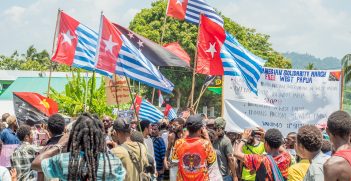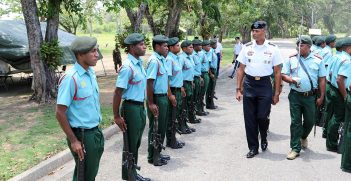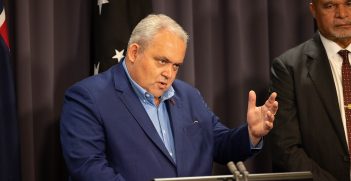A Smooth Election? - Papua New Guinea Votes 2022

This week, Papua New Guineans began the process of electing their new prime minister. Amid concerns of violence and corruption, local issues have dominated.
On Monday, 4 July, Papua New Guineans began heading to the polls to elect their new Prime Minister. Over the next three weeks, more than five million people will decide who will lead their country for the next five years. After three weeks of polling, it will then be another several weeks until we know who the next prime minister of Papua New Guinea (PNG) will be.
More than 3600 nominees are contesting 118 electorates, which include 22 provincial seats – the winners of which also serve as the provincial governor. The remaining 96 seats are “open” electorates, dispersed evenly throughout the country. There are around 50 parties competing for seats, which means a majority government is almost impossible. Instead, political leaders are required to form large coalitions, which are often a product of intense negotiation, with politicians sometimes changing parties.
Of the over 3500 nominees, only 167 are women, and there are currently no women MPs in parliament, which last went to the polls in 2017. Indeed, since PNG’s independence from Australia in 1975, only seven women have served in the National Parliament. There have been attempts to establish reserved seats for women, but these have been defeated in parliament. One step being taken in 2022 to make the electoral process more accessible to women are “women-only” voting lines. These have been instituted to prevent women voters from being intimidated by men and can be presented as a step towards making PNG politics more inclusive towards women.
The Campaign
Over the course of a six-week campaign period, the nominees held rallies to convince voters that they were the best candidate. The campaign period got off to a tragic start, when Deputy Prime Minister Sam Basil died in a car accident in May, just before the issuing of writs. In what has become an unfortunate feature of PNG elections, an estimated 30 people have died in campaign-related accidents and violence in this election cycle. Nevertheless, most observers claim this has been a relatively peaceful campaign. There have also been accusations of corruption and theft, including concerns over the actions of Prime Minister James Marape’s son and the transporting of PNG K1.065 million (around $440,000 AUD).
The two frontrunners are current Prime Minister James Marape of the Pangu Pati and his predecessor, Peter O’Neill, of the People’s National Congress. Given the disparate nature of Papua New Guinean politics, several other parties are also vying for the top spot, such as the National Alliance Party, United Resource Party, and PeopleFirst. As the incumbent, Marape has access to significant resources that put him in a strong position, however, O’Neill has been able to raise large amounts of money for the campaign.
Local issues form the basis of PNG electoral politics. University of Papua New Guinea lecturer Maholopa Laveil describes the political system as “clientelistic,” as significant proportions of the PNG population choose their vote on a transactional basis. If an MP can demonstrate to their electorate that they have provided sufficient development to a district, then they can feel confident of re-election. This transactional attitude has been pronounced in the current election campaign, with many Papua New Guineans calling for improved infrastructure, including access to water and better health services. This has been particularly evident during the COVID-19 pandemic, with only around 3.5 percent of Papua New Guineans vaccinated against the virus.
Prime Minister Marape has campaigned on the slogan of “Take Back PNG,” as he claims to continue reforms that were initiated after his motion of no confidence removed Peter O’Neill in 2019. Marape hopes to continue his reforms, which are aimed at overcoming the claims of economic mismanagement under his predecessor. Accompanying this policy has been Marape’s stated aim of making PNG “the richest black Christian nation on earth.”
In contrast, Peter O’Neill has travelled the country seeking to convince Papua New Guineans that Marape has failed in his economic reforms, and that his 2019 overthrow was unjust and ultimately bad for PNG.
In the several days since polls have opened, the main issue involves outdated electoral lists. Voters whose names are not on the rolls have caused disruptions to the polling, and some have attacked electoral officials in frustration, after waiting in line for several hours. These kinds of issues point to the challenges in running a general election in PNG, which has a poorly resourced electoral commission and electorates that feature extremely difficult terrain. It remains to be seen if the relatively peaceful polling process maintains over the next two weeks.
Broader considerations
While local political considerations dominate the electoral campaign, there has been some attention given to broader national and even foreign policy issues. A visit by Chinese Foreign Minister Wang Yi during the electoral campaign was awkwardly timed and led to some questions regarding a shift in PNG’s foreign policy. Foreign policy is not a partisan issue in PNG, and there is large acceptance of the need to maintain close relations with Australia and the United States, while also acknowledging the importance of Chinese trade ties.
In keeping with Australia’s historical relationship with PNG, remembering PNG was an Australian colony until 1975, Australian Prime Minister Anthony Albanese will be the first foreign leader to visit the new government in September. Regardless of who wins the election, maintaining close relations with Australia will be a central aim of the new government. Indeed, Australia is assisting with the elections through the provision of 130 Australian Defence Force personnel and through the allocation of economic assistance.
Until then, it will be a process of waiting, and seeing the polls’ results and then watching the coalition negotiations proceed. This will take many weeks, and it will be at least August until we know exactly who the new Prime Minister will be.
Dr Nicholas Ferns is a research fellow in History at Monash University. He is a historian of Australian foreign aid and Australia’s colonial rule in Papua New Guinea. His first book, titled Australia in the Age of Development, 1945-1975, was published in 2020.
This article is published under a Creative Commons Licence and may be republished with attribution.





